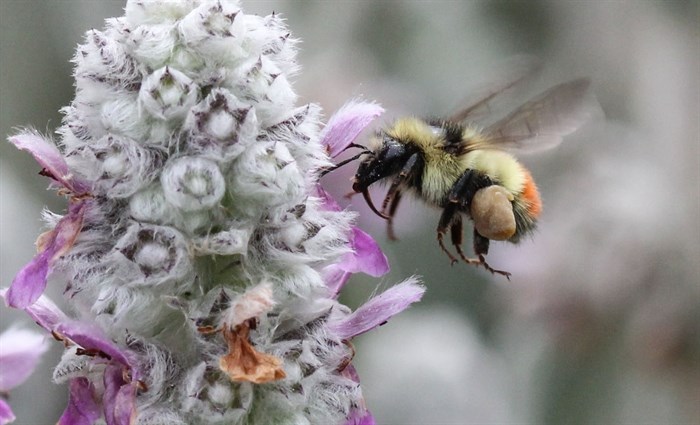
Image Credit: SUBMITTED/UBCO
April 25, 2022 - 7:00 AM
A Similkameen beekeeper, who lost hives this past fall due to flooding, is now looking ahead to the summer to see whether the heat will have an impact.
Cheryl Tarves, co-owner of Similkameen Apiaries, lost 48 honeybee hives when the Similkameen River flooded its banks. That’s nothing compared to the loss of an Alberta beekeeper who lost more than 1,000 hives in the Similkameen area while he was wintering his bees due to flooding, she said.
The losses account for roughly 20% of her hives, in this day and age about par for the course, she said. The long-time beekeeper said they will be able to recover within the year but said her bees are pollinating later this year due to the cool weather and she’s concerned for what the summer months will bring with another heat dome.
Last summer, temperature records were broken across the province. Kelowna is expected to get the longest and hottest heat waves in the country within the next 30 years compared to other major cities. A University of Waterloo study suggests heat waves could hit Kelowna, Penticton, Vernon and Kamloops that last up to 11 days. The average maximum temperature for the year in Kelowna could reach 40.2 C by 2051, according to the study.
READ MORE: Kamloops, Okanagan cities expected to take brunt of increasing heat waves: study
Over the years with the introduction of Varroa mites, parasites that attack and kill honey bees, beekeepers account for losses following the winter each year and she expects to see a loss of around 20 or 30%, she said. That wasn’t the case this year, but the flooding came as a surprise.
“The cool weather and the wind, that is what has impacted the bees now, because they’ve had a lot of trouble getting out to the pollen flows in trees so right now hives are almost going backward. Beekeepers aren’t seeing the pollen in the hives which is the food that they feed the larva,” Tarves said. Lack of pollen means the queen bee won’t lay eggs.
Although not devastating, the heat last year was harmful to the bees, and she lost queens because of it.
“It’s something for us to be really keeping our eye on how we deal with heat,” she said. “Whether that heat impacts our honey flow, that will be interesting.”
Kevin Dunn, the owner of Okanagan Wildbrush Honey based in Penticton, uses both his own hives and ones from Alberta. The bees handled the winter fairly well but it was challenging with the heat dome, he said.
“When you have late-season queens that are mating in late July and early August, a lot of them lost their viability so that overwintering that some of the colonies didn’t make it,” he said.
About 70% of their bees survived the winter, while typically they’ll see about 80% survival rates.
Other Albertan beekeepers who bring their bees to B.C. for the winter have been impacted by weather and Varroa mites, he said. Dunn used leased hives from Saskatchewan to pollinate orchards, but has had issues this season with bears destroying them.
They’ve had three hives destroyed so far with the late spring. He’s last seen this as an issue in 2009. “We really need to up the awareness among growers and get everyone on a protection program to minimize the losses,” he said.
Provincial apiculturist Paul van Westendorp said preliminary losses of B.C. hives have been a “smorgasbord” of results with some reporting significant losses while others report the best year they’ve had.
READ MORE: The challenges faced by these Kamloops beekeepers
However, preliminary results are showing there has been a greater than normal winter loss, he said. With the floods across the province, roughly 2,000 colonies were lost but 1,500 of them were in the Similkameen due to a few beekeepers in the area that lost a significant number of colonies. A federal recovery program has donated $228 million to agriculture workers to recover their stock following the floods.
The province conducts a survey each year amongst beekeepers and the results will be released in June, van Westendorp said.
To contact a reporter for this story, email Carli Berry or call 250-864-7494 or email the editor. You can also submit photos, videos or news tips to the newsroom and be entered to win a monthly prize draw.
We welcome your comments and opinions on our stories but play nice. We won't censor or delete comments unless they contain off-topic statements or links, unnecessary vulgarity, false facts, spam or obviously fake profiles. If you have any concerns about what you see in comments, email the editor in the link above.
News from © iNFOnews, 2022